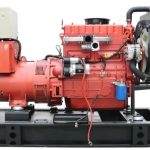Ensuring Compliance with Environmental Standards The Role of Diesel Generators

Introduction
Diesel generators play a crucial role in providing backup power in various applications, including industrial, commercial, and residential settings. However, the use of diesel generators also raises concerns about their environmental impact. In recent years, there has been a growing emphasis on environmental standards and regulations to mitigate the harmful effects of diesel generator emissions. This article explores the environmental challenges associated with diesel generators and the measures that can be taken to ensure compliance with environmental standards.
Environmental Impact of Diesel Generators
Diesel generators are known for their efficiency and reliability in generating electricity. However, they also produce emissions that can have adverse effects on the environment and human health. The combustion of diesel fuel in generators releases pollutants such as nitrogen oxides (NOx), particulate matter (PM), carbon monoxide (CO), and hydrocarbons (HC). These pollutants contribute to air pollution, smog formation, and respiratory illnesses.

One of the major environmental concerns associated with diesel generators is their contribution to air pollution. NOx emissions from diesel generators react with other compounds in the atmosphere to form ground-level ozone, which can cause respiratory problems and exacerbate existing health conditions. Particulate matter emitted by diesel generators can also have serious health impacts, especially for vulnerable populations such as children, the elderly, and individuals with respiratory conditions.
In addition to air pollution, diesel generators also emit greenhouse gases such as carbon dioxide (CO2) and methane (CH4). These gases contribute to climate change and global warming, leading to more frequent and severe weather events, rising sea levels, and other environmental impacts.
Regulatory Framework for Diesel Generators
Recognizing the environmental impact of diesel generators, governments and regulatory bodies around the world have implemented various standards and regulations to control emissions from these sources. https://www.lkpowerplant.com/how-to-calculate-the-efficiency-of-a-diesel-generator/ aim to limit the amount of pollutants emitted by diesel generators and promote the use of cleaner technologies and fuels.
One of the key regulatory frameworks for diesel generators is the emission standards set by environmental agencies such as the Environmental Protection Agency (EPA) in the United States and the European Union's emission standards for non-road mobile machinery. These standards specify the maximum allowable levels of pollutants that can be emitted by diesel generators and require manufacturers to develop technologies to meet these requirements.
In addition to emission standards, regulations may also include requirements for the installation and operation of diesel generators to minimize their environmental impact. For example, zoning regulations may restrict the location of diesel generators to minimize their exposure to sensitive receptors such as schools, hospitals, and residential areas. Noise regulations may also be in place to limit the noise levels produced by diesel generators during operation.
Compliance with Environmental Standards
Ensuring compliance with environmental standards is essential to minimize the environmental impact of diesel generators. There are several measures that can be taken to achieve compliance and reduce emissions from diesel generators:
1. Use of Cleaner Fuels: Switching to cleaner fuels such as ultra-low sulfur diesel (ULSD) or biodiesel can help reduce emissions of pollutants such as sulfur dioxide (SO2) and particulate matter. These fuels produce fewer harmful emissions compared to traditional diesel fuel and can help diesel generators meet emission standards.
2. Retrofitting and Upgrading: Retrofitting diesel generators with emissions control technologies such as diesel particulate filters (DPF) and selective catalytic reduction (SCR) systems can help reduce emissions of NOx and particulate matter. Upgrading older diesel generators with modern technologies can improve their environmental performance and ensure compliance with emission standards.
3. Regular Maintenance and Inspections: Proper maintenance and regular inspections of diesel generators are essential to ensure they are operating efficiently and emitting minimal pollutants. This includes cleaning filters, checking for leaks, and tuning the engine to optimize performance and reduce emissions.
4. Emission Monitoring and Reporting: Installing emission monitoring systems on diesel generators can help track their emissions and ensure compliance with regulatory standards. Regular reporting of emissions data to environmental authorities can demonstrate compliance and help identify areas for improvement.
5. Energy Efficiency Measures: Improving the energy efficiency of diesel generators can help reduce fuel consumption and emissions. This can be achieved through measures such as load management, optimizing operating conditions, and using energy storage systems to reduce the need for continuous generator operation.
Conclusion
Diesel generators play a critical role in providing backup power in various applications, but their environmental impact is a growing concern. Emissions from diesel generators contribute to air pollution, climate change, and other environmental issues, highlighting the need for stringent environmental standards and regulations. By implementing measures such as using cleaner fuels, retrofitting with emissions control technologies, and ensuring proper maintenance, compliance with environmental standards can be achieved, reducing the environmental impact of diesel generators. It is essential for stakeholders including manufacturers, operators, and regulatory bodies to work together to promote sustainable practices and minimize the environmental footprint of diesel generators.
